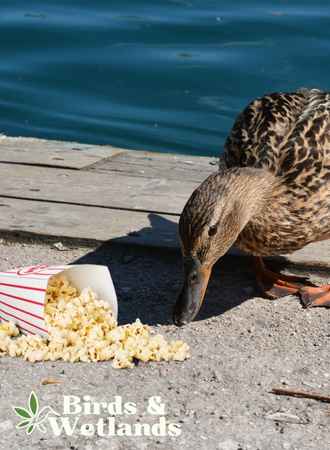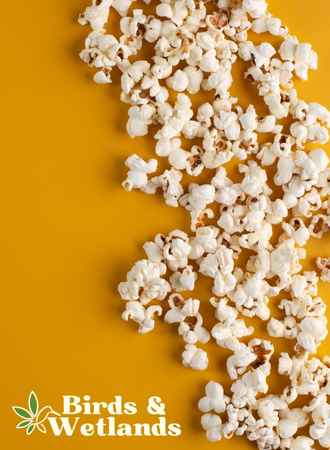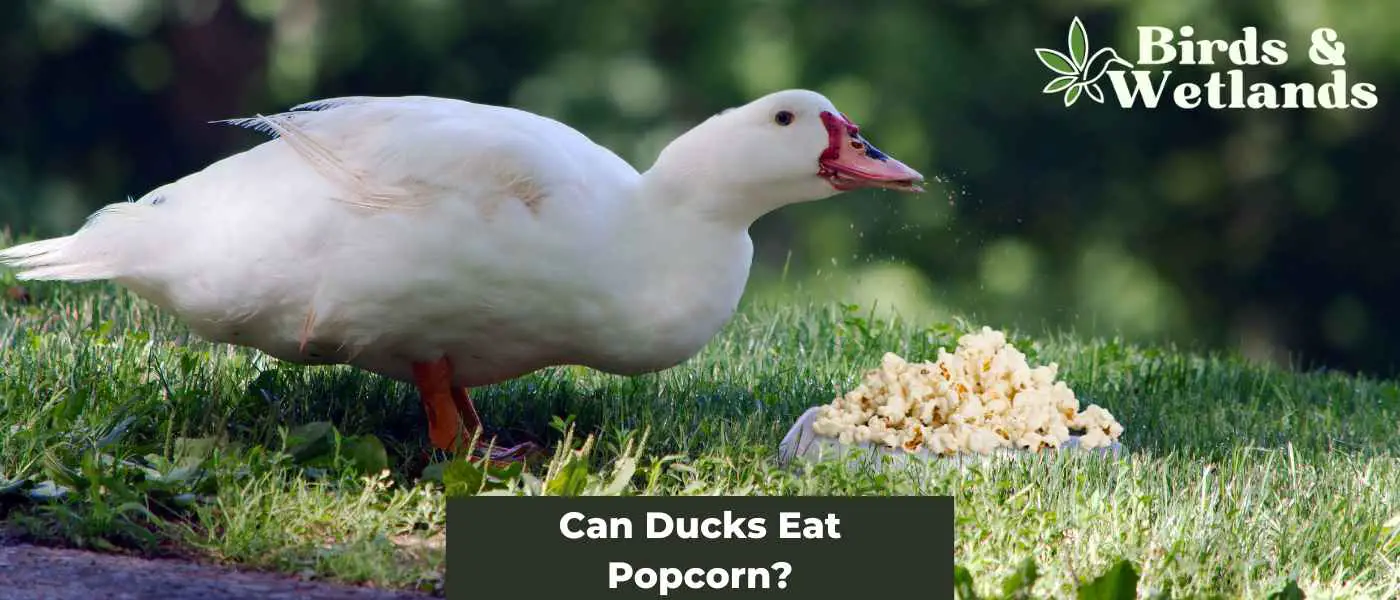Ducks are known for their love of snacking on various foods, but what about popcorn? Can ducks safely consume this popular movie-time snack?
Is popcorn one of the foods they can’t eat?
Ducks can eat popcorn, but it should be given in moderation and with caution. If you choose to feed ducks popcorn, ensure it is plain, unsalted, and unbuttered. Additionally, it is best to offer air-popped popcorn, as it contains less oil and fewer additives than commercially prepared popcorn. However, popcorn should not be a significant part of a duck’s diet, treats like popcorn should be given sparingly.
Key Takeaways on Can Ducks Eat Popcorn
- Popcorn is not a recommended food for ducks, as it lacks the necessary nutrients and can cause digestive issues.
- Feeding ducks large amounts of popcorn may also lead to obesity and other health problems.
- While small amounts of plain, unsalted popcorn as an occasional treat is unlikely to cause harm, it is still important to provide ducks with a well-balanced diet.
Is popcorn bad for ducks?
Yes, popcorn is bad for ducks. Here are the reasons why they should not be eating popcorn:

Little nutritional value
Popcorn is a snack made from corn kernels that have been heated and popped. While it may be a tasty treat for humans, it does not provide ducks with any significant nutritional benefits.
Popcorn is low in protein, fiber, and essential vitamins and minerals, which are all important for ducks to maintain good health and proper growth.
Prepared using butter, salt and oil
Popcorn is a favorite snack in many people’s homes. As a human food, popcorn is prepared using an air-popping method and is usually flavored using ingredients made for human consumption. Popcorn is often prepared using butter, salt, and oil, which can harm ducks.
These ingredients are high in fat and sodium, leading to obesity and other health problems in ducks if consumed in large quantities.
Additionally, the oil used to prepare popcorn may contain trans fats, which have been linked to heart disease and other health issues.
Huge Choking hazard
Ducks don’t chew their food because they don’t have teeth. So swallowing whole popcorn can be a choking hazard for ducks.
Ducks swallow their food whole, and small pieces of popcorn can easily get stuck in their throat or windpipe, causing them to choke.
Difficult to digest
Since popcorn is human food, ducks may have difficulting digesting it. The high fiber content of corn kernels can cause digestive issues in ducks, such as bloating, gas, and diarrhea.
Additionally, foreign substances in their digestive system can disrupt the delicate balance of bacteria and lead to further digestive problems.
Not part of a duck’s natural diet
Ducks are adapted to eat a varied diet of aquatic plants, fish eggs, small insects and small fish. These foods help them obtain all the nutrients they need to stay healthy.
Popcorn is not a natural part of this diet, and as such, it may not provide ducks with the nutrients they need to thrive.
It is important to feed ducks a varied and balanced diet that includes a variety of seeds, grains, and insects to ensure their overall health and well-being.
Not all ducks may like the taste of popcorn, so it becomes leftover food that can attract rodents and other wildlife.

Can baby ducks eat popcorn?
No, you should not feed popcorn to young ducks. Junk foods are bad for a young duck’s diet. Ducklings should be eating formulated started feed, aquatic vegetation and small insects, supplemented with other healthy food sources.
Can ducks eat popcorn kernels?
Popcorn kernels are worse than popcorn to feed the ducks. They are hard to digest, so they stay in the duck’s digestive system for a long time. Remember that ducks possess a relatively small esophagus, which means hard foods are likely to get stuck.
If food remains in the digestive system for an extended period, it can cause serious health problems for your pet ducks. It can lead to constipation, abdominal pain, and bloating.
When food remains in the digestive system for too long, bacteria can start to break it down and produce toxins. These toxins are absorbed into the bloodstream and cause symptoms such as nausea and vomiting.
Healthier Alternatives to Popcorn
If you are raising ducks or just want to feed ducks at your local park something healthier, here are good alternatives to popcorn:
- Whether you’re feeding West Indian whistling, wandering whistling or lesser whistling ducks at your local pond, they should not be eating popcorn. A good alternative for them are duck feed pellets and chicken feed, which are specially formulated to meet their nutritional needs. These pellets are the same food you can get from your local pet store.
- Avoid feeding ducks bread, potato chips, popcorn, rice cakes and other fried dough-based foods. If you want to give wild birds a good energy source, feed them cracked corn, fresh corn, frozen peas and cooked rice instead.
- Be careful when feeding ducks corn. Feeding corn is generally good, but you should avoid frozen corn which is bad for your duck’s health.
- Most backyard ducks are not picky eaters, so you can feed them dog food if you have extra.
- Sunflower seeds can be a healthy snack but you can’t get some ducks to eat them. If your ducks or other waterfowl will not eat sunflower seeds, feed them different kind of seeds or other grains instead.
- Don’t feed citrus fruit to a female duck with ducklings in tow because the fruit is acidic and bad for young ducks.
Similar Foods to Feed Ducks
| Almonds | Almonds: A Treat for Ducks? |
| Apples | Can Ducks Munch on Apples? |
| Cucumber | Do Ducks Enjoy Cucumber? |
| Grapes | Are Grapes Safe for Ducks? |
| Rice | Can Ducks Eat Rice Safely? |
Best Duck Feed Pellets
Are you a duck owner looking for the perfect feed to keep your feathered friends happy and healthy? Look no further than Purina Duck Feed Pellets! With their nutritionally balanced formula and high-quality ingredients, these pellets are the ultimate solution for providing your ducks with the nutrition they need to thrive.
Pros
- Complete Nutrition: Purina Duck Feed Pellets are nutritionally balanced to provide all the essential vitamins and minerals that ducks need to stay healthy and strong.
- Easy to Digest: The pellets are specially formulated to be easy to digest, which makes them ideal for ducks of all ages.
- Promotes Growth and Development: With its balanced nutrition formula, Purina Duck Feed Pellets are designed to support healthy growth and development in ducks.
- Suitable for All Breeds: Whether you have domestic ducks or wild ducks, Purina Duck Feed Pellets are suitable for all breeds of ducks.
- Trusted Quality: Purina has been producing high-quality animal feed for over 100 years, so you can trust that your ducks are getting the best possible nutrition with Purina Duck Feed Pellets.
Cons
- Cost: Compared to other types of duck feed on the market, Purina Duck Feed Pellets can be slightly more expensive. However, many customers feel that the high-quality ingredients and balanced nutrition formula are worth the extra investment.
- Pellet Size: Some customers have noted that the pellet size of Purina Duck Feed Pellets can be quite large, which may not be suitable for smaller or younger ducks. However, many customers have reported that the pellets can easily be broken up or soaked in water to make them easier to eat.


